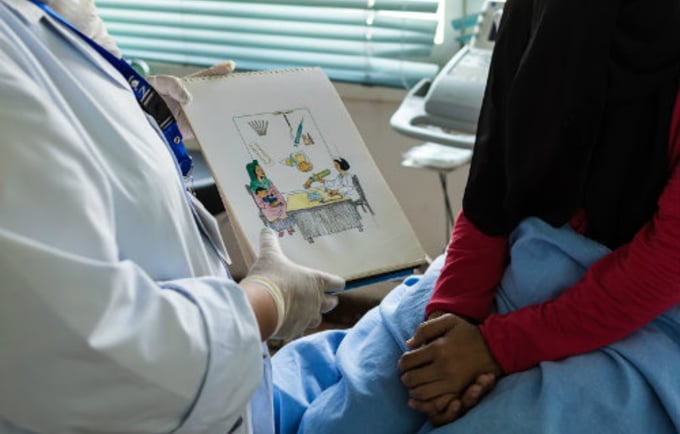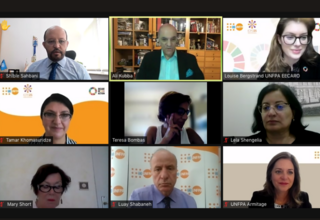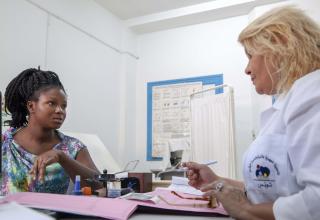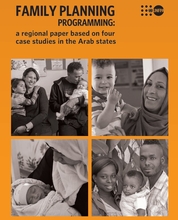Access to safe, voluntary family planning is a human right. Family planning is central to gender equality and women’s empowerment, and it is a key factor in reducing poverty. In 2019, some 60.5% of married Arab women were estimated to want to avoid pregnancy in the upcoming 2 years, 40% of them are not using safe and effective family planning methods. Their reasons range from lack of access to information or services to lack of support from their partners or communities.
UNFPA works to support family planning by: ensuring a steady, reliable supply of quality contraceptives; strengthening national health systems; advocating for policies supportive of family planning; and gathering data to support this work. UNFPA also provides global leadership in increasing access to family planning, by convening partners – including governments – to develop evidence and policies, and by offering programmatic, technical and financial assistance to developing countries.
In the Arab region, UNFPA has supported the League of Arab States to develop their 11-year strategy on Maternal, Child and Adolescent Health (2019-2030), to ensure that every woman can access family planning services, and choose their preferred method in line with the Sustainable Development Goals agenda and the ICPD programme of action. Additionally, UNFPA conducted a study on unintended pregnancies in the Arab states to identify the challenges women and girls are facing to access reliable quality family planning information, services and commodities. Addressing those barriers will contribute to decreasing complications of unwanted pregnancies such as unsafe abortions, school drop-out or infanticide.
Family planning saves lives
Contraceptives prevent unintended pregnancies, reduce the number of abortions, and lower the incidence of death and disability related to complications of pregnancy and childbirth. Male and female condoms, when used correctly and consistently, are the only methods to provide dual protection against both unintended pregnancy and sexually transmitted infections (STIs), including HIV. If all women and girls with an unmet need for contraceptives were able to use modern methods, an additional 2 million abortions, in North Africa alone would have been prevented, of which two-thirds are unsafe. Additionally, nearly 70,000 infant deaths would be prevented. In total 15% of women and girls in the Arab States aged between 15-49 years have an unmet need for family planning.Women’s and adolescents’ right to contraceptive information and services is grounded in basic human rights. The Programme of Action of the International Conference on Population and Development (ICPD) recognized “the right of men and women to be informed and to have access to safe, effective, affordable and acceptable methods of family planning of their choice”. This agreement lays the foundation for much of UNFPA’s work.
With women and children getting access to needed health and family planning services, this will lead to a decrease in unplanned pregnancies by 70%, and a decrease in unsafe abortions by 67%. Maternal deaths will decrease by 67% in comparison to 2014 rates, while the newborn mortality rate will decrease by 77%.
Increasing access to modern contraception among adolescents is a crucial starting point for improving their long-term health. It is also essential for improving maternal and newborn health. In the Arab region, complications from pregnancy and childbirth key contributors to the causes of deaths of adolescent girls (aged 15-19). Their babies also face a higher risk of dying than the babies of older women. Yet adolescents face enormous barriers to accessing reproductive health information and services.
Family planning empowers women
Access to contraceptive information and services is central to achieving gender equality. When women and couples are empowered to plan whether and when to have children, women are better enabled to complete their education; women’s autonomy within their households is increased; and their earning power is improved. This strengthens their economic security and well-being for them and their families. Cumulatively, these benefits contribute to poverty reduction and sustainable development.
Family planning brings economic benefits
There are clear economic benefits to investing in family planning. In 2015, UNFPA in Egypt led an economic return on investment analysis on family planning and the results highlighted that for every Egyptian pound invested in family planning programme there is a return on investment equaling more than 56 Egyptian pounds over the period 2014-2050.
Family planning can also help countries realize a ‘demographic dividend’ especially that the Arab region population structure is currently characterized by a phenomenon that is called a youth bulge, a boost in economic productivity that occurs when there are growing numbers of people in the workforce and falling numbers of dependents.
Overcoming barriers to family planning
Common reasons why women do not use contraceptives include inaccessibility due to logistical problems, such as difficulty travelling to health facilities or supplies running out at health clinics. Inaccessibility can also be due to socio-cultural barriers, such as opposition by partners, local myths and wrong beliefs, and pressure from families or peers. Lack of knowledge also plays a deterring role, with many women not understanding that they are able to become pregnant, not knowing what contraceptive methods are available, relying on traditional contraceptive methods, or having incorrect perceptions about the health risks of modern methods.
There are a number of challenges to improving access to family planning information and services. Efforts to increase access must be sensitive to cultural, religion and national contexts, and must consider economic, geographic and age disparities within countries.
Poorer people, less educated persons and those in rural areas often have less access to family planning services. Certain groups – including, but not limited to, adolescents, unmarried women, the urban poor, rural populations, refugees, migrants, internally displaced persons, persons with disabilities, and people living with HIV – also face a variety of barriers to reproductive health care and family planning. This can lead to higher rates of unintended pregnancy, increased risk of HIV and other STIs, limited choice of contraceptive methods, and higher levels of unmet need for family planning. Particular attention must be paid to promoting their reproductive rights, access to family planning, and other sexual and reproductive health services.
UNFPA’s work
UNFPA works at every level to improve access to family planning and empower individual choices , partnering with governments, NGOs, community-service organizations, faith-based organizations, youth groups and the private sector. With its partners, UNFPA helps to strengthen community-based and youth-friendly reproductive health services, and to provide these services during humanitarian crises. UNFPA in the Arab region dedicates significant amounts of attention and resources to the generation and use of evidence for advocacy and informing policy development and national planning efforts whether through direct support to national counterparts or through regional platforms including the league of Arab states, the organization of Islamic cooperation and the African Union. UNFPA also works on and advocates for enhancing integration of SRH care into primary healthcare to ensure women’s and adolescent girls access to the care they need and develops technical assistance tools to support ministries of health assess the different elements of the health services that require integration and monitor progress of national efforts in this regard.
And through its UNFPA Supplies programme, UNFPA works with partners and governments to ensure access to a reliable supply of contraceptives, condoms, and medicines and equipment for family planning, STIs prevention and maternal health services. UNFPA also works to integrate family planning services into primary health care, so that women and girls are able to access information and contraceptives no matter what health facility they visit.
To respond to the urgent family planning needs during humanitarian crises, UNFPA provides emergency reproductive health kits and contraceptives to the Ministry of Health and all non-governmental partners providing reproductive health services in affected Arab countries. These pre-packaged reproductive health kits contain contraception methods including condoms, intrauterine devices, contraceptive pills and injectables.
Updated 20 April 2015.




